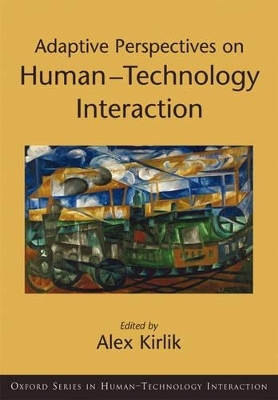
Adaptive Perspectives on Human-Technology Interaction
Methods and Models for Cognitive Engineering and Human-Computer Interaction
Seiten
2006
Oxford University Press Inc (Verlag)
978-0-19-517182-2 (ISBN)
Oxford University Press Inc (Verlag)
978-0-19-517182-2 (ISBN)
How to understand and support cognition in human-technology interaction is both a practically and socially relevant problem. The chapters frame this problem in adaptive terms: how are behaviour and cognition adapted, or perhaps ill-adapted, to the demands and opportunities of an environment where interaction is mediated by tools and technology?
In everyday life, and particularly in the modern workplace, information technology and automation increasingly mediate, augment, and sometimes even interfere with how humans interact with their environment. How to understand and support cognition in human-technology interaction is both a practically and socially relevant problem. The chapters in this volume frame this problem in adaptive terms: how are behaviour and cognition adapted, or perhaps ill-adapted, to the demands and opportunities of an environment where interaction is mediated by tools and technology? The authors draw heavily on the work of Egon Brunswik, a pioneer in ecological and cognitive psychology, as well as on modern refinements and extensions of Brunswikian ideas, including Hammond's Social Judgment Theory, Gigerenzer's Ecological Rationality and Anderson's Rational Analysis. Inspired by Brunswik's view of cognition as "coming to terms" with the "causal texture" of the external world, the chapters in this volume provide quantitative and computational models and measures for studying how people come to terms with an increasingly technological ecology, and provide insights for supporting cognition and performance through design, training, and other interventions. The methods, models, and measures presented in this book provide timely and important resources for addressing problems in the rapidly growing field of human-technology interaction.
In everyday life, and particularly in the modern workplace, information technology and automation increasingly mediate, augment, and sometimes even interfere with how humans interact with their environment. How to understand and support cognition in human-technology interaction is both a practically and socially relevant problem. The chapters in this volume frame this problem in adaptive terms: how are behaviour and cognition adapted, or perhaps ill-adapted, to the demands and opportunities of an environment where interaction is mediated by tools and technology? The authors draw heavily on the work of Egon Brunswik, a pioneer in ecological and cognitive psychology, as well as on modern refinements and extensions of Brunswikian ideas, including Hammond's Social Judgment Theory, Gigerenzer's Ecological Rationality and Anderson's Rational Analysis. Inspired by Brunswik's view of cognition as "coming to terms" with the "causal texture" of the external world, the chapters in this volume provide quantitative and computational models and measures for studying how people come to terms with an increasingly technological ecology, and provide insights for supporting cognition and performance through design, training, and other interventions. The methods, models, and measures presented in this book provide timely and important resources for addressing problems in the rapidly growing field of human-technology interaction.
Alex Kirlik teaches Human Factors, Industrial Engineering, and Psychology at the University of Illinois at Urbana-Champaign, where he is also a member of the Beckman Institute for Advanced Science and Technology.
PART I BACKGROUND AND MOTIVATION; PART II TECHNOLOGICAL INTERFACES; PART III AUTOMATION AND DECISION AIDING; PART IV ALTERNATIVES TO COMPENSATORY MODELING; PART V INTO THE FIELD: VICARIOUS FUNCTIONING IN ACTION; PART VI ECOLOGICAL ANALYSIS MEETS COMPUTATIONAL COGNITIVE MODELING; PART VII REFLECTIONS AND FUTURE DIRECTIONS
| Erscheint lt. Verlag | 18.5.2006 |
|---|---|
| Reihe/Serie | Human Technology Interaction Series |
| Zusatzinfo | 82 line illustrations |
| Verlagsort | New York |
| Sprache | englisch |
| Maße | 254 x 180 mm |
| Gewicht | 816 g |
| Themenwelt | Geisteswissenschaften ► Psychologie ► Allgemeine Psychologie |
| Geisteswissenschaften ► Psychologie ► Biopsychologie / Neurowissenschaften | |
| Geisteswissenschaften ► Psychologie ► Sozialpsychologie | |
| Geisteswissenschaften ► Psychologie ► Test in der Psychologie | |
| Geisteswissenschaften ► Psychologie ► Verhaltenstherapie | |
| Mathematik / Informatik ► Informatik ► Theorie / Studium | |
| ISBN-10 | 0-19-517182-9 / 0195171829 |
| ISBN-13 | 978-0-19-517182-2 / 9780195171822 |
| Zustand | Neuware |
| Haben Sie eine Frage zum Produkt? |
Mehr entdecken
aus dem Bereich
aus dem Bereich
Buch | Softcover (2024)
Hogrefe Verlag
CHF 46,50


